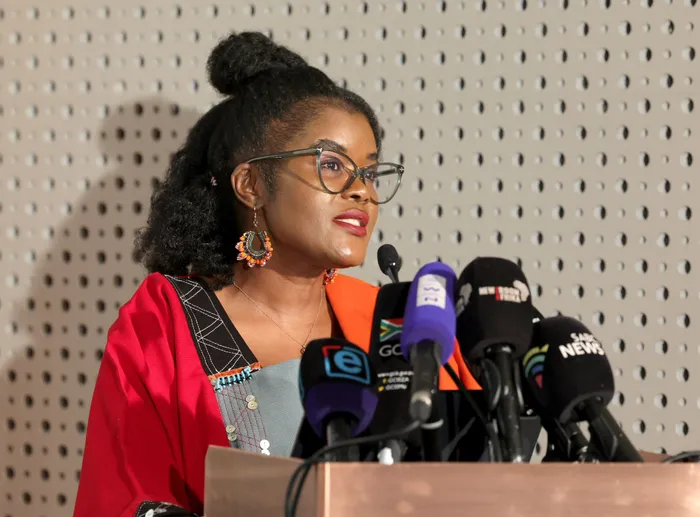A Call for Stability in Higher Education Leadership

With increasing pressure on Minister Nkabane amid controversies in higher education, Marius Fransman argues for the importance of stability and strategic leadership in South Africa's education sector to ensure a brighter future for our youth.
Image: GCIS
Before my appointment as Deputy Minister of International Relations and Cooperation, I served as Chairperson of the Portfolio Committee on Higher Education and Training in the National Assembly. As an educator by training myself, I have held education as one of the most important sectors in our country. The stability in the sector is something we all must jealously protect.
In recent weeks, the Minister of Higher Education, Science and Innovation, Dr Nobuhle Pamela Nkabane, has come under heightened public pressure following the controversy surrounding the appointment of SETA board chairpersons. While the procedural lapses warrant attention, it is critical to pause and evaluate the broader impact of her leadership and the long-term direction of the higher education sector in South Africa.
Minister Nkabane holds a PhD and brings to her role not only political leadership, but also academic credibility. She has consistently driven a performance-based agenda within her department, with a strong emphasis on risk mitigation, transparency, and budgetary stability. Under her stewardship, institutional subsidies to public universities have increased steadily, and infrastructure allocations over the medium term reflect strategic investments in campuses across the country.
The higher education landscape, while not without challenges, has shown promising signs of stability and growth. Universities such as Limpopo and UNISA have gained traction as nationally significant institutions. There is also clear recognition that the TVET college sector and universities of science and technology require intensified focus. The Minister has acknowledged this, and her policies reflect growing allocations to these sub-sectors, with an aim to rebalance the system toward inclusive access and meaningful skills development.
Minister Nkabane made an error in prematurely stating the role of Advocate Terry Motau SC in the non-statutory SETA panel process. But instead of obfuscating the issue or retreating into silence, she issued multiple apologies—both to Parliament and to the Advocate. She clarified the matter, provided the necessary background, and committed to corrective action. Notably, even in her initial statement to Parliament, she disclosed that Advocate Motau had not attended any panel meetings—a fact that supports the view that his inclusion was likely an administrative oversight rather than a deliberate misrepresentation.
Moreover, in a display of executive accountability, the Minister has taken the bold step of restarting the entire appointment process from scratch, applying a "tabula rasa" approach to rebuild confidence.
The SETA ecosystem is one of the most contested terrains in the public sector, with various business interests often lobbying aggressively for influence. Public controversies within this space should always be viewed with caution, as they may often reflect undisclosed agendas with little to do with the actual delivery of skills training and post-school education for South Africa's youth.
It is important to assess the Minister not solely through the lens of this controversy, but also through her alignment with the higher education sector's governing party resolutions—particularly the mandate to build a coherent, ethical, and future-ready post-school education and training system. Dr Nkabane has actively invested in bursary systems, TVET revitalisation, and institutional governance that supports academic performance.
To be sure, much remains to be done. TVET colleges must be expanded and made more attractive to young South Africans. Science and technology universities need urgent curriculum renewal, modern research infrastructure, and improved governance. But these are precisely the reasons to strengthen leadership, not destabilise it.
Having heard student bodies, business stakeholders, and political actors call for Minister Nkabane's resignation, perhaps we must also ask: where are the calls for resignation in other departments where dysfunction has been far more tangible? Leadership must be held to account, yes—but political contestation must not become a blunt instrument used to weaken the very institutions we seek to reform. As we approach local government elections next year, we must remain vigilant against special interest manoeuvres that disguise themselves as moral outrage.
What is often not discussed are the real consequences of destabilising the Department of Higher Education and Training at this critical time. Budget allocations—particularly for NSFAS, TVET infrastructure, university subsidies, and innovation projects—are planned well in advance. If a political standoff leads to delays in budgetary appropriations or causes leadership vacuum, the academic year risks disruption. Students may not receive bursaries in time; campus development projects may stall; and institutions may experience administrative paralysis.
Furthermore, the appointment of a new minister—if one were to happen under pressure—would come at significant cost to continuity. As we approach the third quarter of the year, systems are already in motion for the 2026 academic cycle. It takes time, often months, for a new minister to fully grasp the portfolio, assess the machinery of the department, engage stakeholders, and begin to implement meaningful interventions. Such a delay is unaffordable in a country battling youth unemployment and economic precarity.
Minister Nkabane may not be perfect, but she has consistently shown her willingness to do self-correction, academic grounding, and a clear strategic vision for higher education. Her performance—not a procedural misstep—should remain the guiding measure of public confidence.
In this moment, I call on the Minister, students, academic faculties, labour representatives, and all sector stakeholders to come together in dialogue and common purpose—for the sake of South Africa's youth, our institutions, and the future progress of our country. South Africa is in dire need of a Skills Revolution—my challenge is to the Minister to convene an urgent Skills Summit and bring State and Non-State Actors together in the build-up to the National Dialogue to be held on August 15, 2025.
* Marius Fransman is the Leader of People's Movement for Change (PMC).
** The views expressed do not necessarily reflect the views of IOL or Independent Media.
Related Topics: